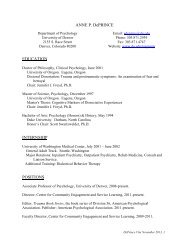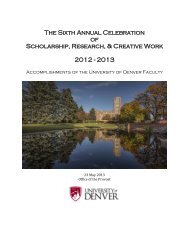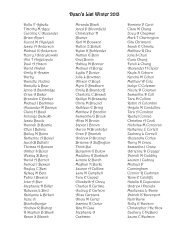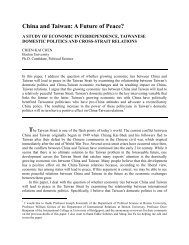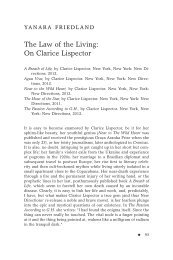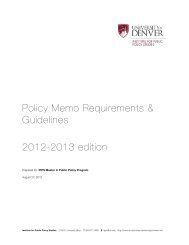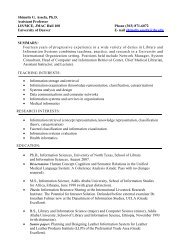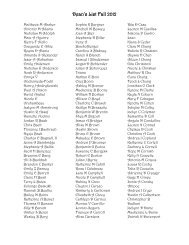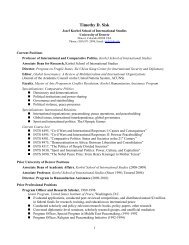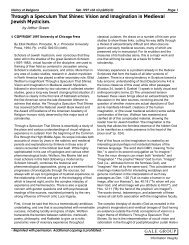Create successful ePaper yourself
Turn your PDF publications into a flip-book with our unique Google optimized e-Paper software.
gssw alumni news<br />
Class Notes<br />
Got News?<br />
Please email your<br />
personal and pr<strong>of</strong>essional<br />
updates. Be sure to<br />
include the degree(s) you<br />
earned at <strong>GSSW</strong> and the<br />
year(s) you graduated.<br />
Feel free to attach a<br />
digital photo if you’d<br />
like. Class Notes may<br />
be edited or held for a<br />
future issue due to space<br />
limitations.<br />
36 spring 12 gssw alumni news<br />
worker/teacher is a perfect combination for working with<br />
these students,” she says. “Now, I teach about Jim Crow and<br />
the wonderful lesson for children: Yes, it was terrible, but<br />
look what you can do. You can change things!”<br />
In 2009, Hathaway’s son was pulled over, without apparent<br />
cause, by <strong>Denver</strong> Police <strong>of</strong>ficers who beat him unconscious.<br />
Transformed that night into a civil rights activist, Hathaway<br />
began a blog on police brutality and racial pr<strong>of</strong>iling. After a<br />
long and highly publicized legal battle, Alex Landau received<br />
the fourth largest settlement in <strong>Denver</strong>’s history, and three<br />
police <strong>of</strong>ficers were fired (although one has since been<br />
rehired). Hathaway recently partnered with the ACLU and<br />
a family at the center <strong>of</strong> another high-pr<strong>of</strong>ile case <strong>of</strong> alleged<br />
police brutality in an effort to bring about lasting change.<br />
“Getting my MSW was a seminal step along my career path,”<br />
says Hathaway. “It is powerful to look back. None <strong>of</strong> it was<br />
easy. But I am no longer on the wrong side <strong>of</strong> Jim Crow,<br />
and I never have to wonder if my work is important. I am<br />
changing things.”<br />
Ron Langer (MSW ’79), LCSW, BCD, received the Community<br />
Service Award from the Colorado Society for Clinical Social<br />
Work at the Colorado Social Work Month Annual Celebration<br />
on March 9.<br />
Major Arthur P. Moser (MSW, PhD ’76),<br />
USAF (Ret.), took special interest in our<br />
Fall 2011 cover story on social work in<br />
the military. Because he already had<br />
been on active duty as an MSW social<br />
worker, Moser’s PhD studies were fully<br />
funded by the Air Force. He notes that<br />
Col. James L. Jenkins (PhD ’74), USAF<br />
(Ret.), was the only Air Force social<br />
worker to precede him in <strong>GSSW</strong>’s<br />
doctoral program.<br />
Moser helped establish the first tri-service alcohol and drug<br />
treatment center in Bethesda, MD, where he was primary<br />
therapist to a number <strong>of</strong> Congressmen and members <strong>of</strong><br />
Presidents’ families, as well as higher ranking active duty<br />
personnel. Moser went on to head the largest treatment center<br />
in the Air Force at Sheppard AFB, where he also wrote the<br />
primary regulations for treatment centers on behalf <strong>of</strong> the Air<br />
Force Surgeon General. Moser completed his military career by<br />
serving in Operation Desert Storm, where he headed a combat<br />
stress field medical unit in the United Arab Emirates.<br />
After retiring from the Air Force, Moser worked in the<br />
first private minimum-security prison in the western U.S.,<br />
which became a treatment model for correctional facilities.<br />
Subsequently he moved to Washington, DC, with his wife,<br />
an architect who headed the group rebuilding the wing <strong>of</strong><br />
the Pentagon that was destroyed in 9/11. Moser’s treatment<br />
program for drug-addicted inmates in Virginia’s Arlington<br />
County Jail has a one-year success rate that exceeds 75%,<br />
making the program a treatment model for jails across the U. S.<br />
“I have much to be grateful for from the military for the<br />
experiences and educational opportunities it afforded me,<br />
and I appreciate my education at DU in this regard,” says<br />
Moser. “I am available to any student who would like more<br />
information.”<br />
’80s<br />
Another graduate with strong military ties is Pat Davis-<br />
Hacker (MSW ’88), LCSW, <strong>of</strong> Yorktown, VA, whose career has<br />
included service to active duty personnel and their families<br />
in the area <strong>of</strong> domestic violence, and work with active duty<br />
Army personnel regarding pre- and post-deployment issues<br />
like PTSD. She’s also provided day treatment to adolescents<br />
in two inner-city school systems. Currently a doctoral<br />
candidate, Davis-Hacker achieved a 4.0 GPA in her coursework,<br />
successfully completed her comprehensive exams and hopes<br />
to finish her dissertation by fall. She returned home to South<br />
Dakota last summer to conduct part <strong>of</strong> her dissertation<br />
research.<br />
Davis-Hacker’s husband served in the U. S. Navy for 18 years,<br />
and the family lived in many locations throughout the U.<br />
S., as well as in Japan and Egypt. After her husband’s 2003<br />
suicide rocked the family to its core, Davis-Hacker and her<br />
three children had to deal not only with grief and loss, but<br />
also with the stigma associated with losing a loved one to<br />
suicide. Davis-Hacker says her pr<strong>of</strong>essional and personal goals<br />
are to continue working with other “survivors <strong>of</strong> suicide” and<br />
helping eradicate that stigma.<br />
Davis-Hacker says her most rewarding experience has been<br />
seeing both her daughters graduate from college with honors,<br />
Cassandra from DU in 2007 and Caryn from Durango’s Ft.<br />
Lewis College last April. Cassandra also served in the U. S.<br />
Army. Davis-Hacker’s son, Christopher, is a high school<br />
senior.<br />
“Being a Native American female raised with both<br />
contemporary and traditional values, the road to academic<br />
success and achievement has been difficult,” Davis-Hacker<br />
says. “However, with pride, perseverance, a love and<br />
appreciation for education, the rewards and blessings we have<br />
received have far outweighed the difficulties and challenges<br />
that life has thrown our family.”<br />
The U. S. Army sponsored the <strong>GSSW</strong> doctoral education <strong>of</strong><br />
T. Paul Furukawa (PhD ’81), whose studies focused on domestic<br />
violence prevention and intervention and multi-disciplinary<br />
responses to child maltreatment in military settings. In addition<br />
to co-creating and teaching courses on social work with Asian<br />
Americans and domestic violence, Furukawa co-chaired the<br />
student/faculty commission that recommended <strong>GSSW</strong> change<br />
its doctoral degree from DSW to PhD.<br />
After graduation, Furukawa served as an Army social work<br />
<strong>of</strong>ficer for over 20 years. He headed part <strong>of</strong> a study by the<br />
Walter Reed Army Institute <strong>of</strong> Research that demonstrated<br />
that military units that train and remain together perform<br />
better and experience fewer stress casualties; these<br />
principles are now an accepted part <strong>of</strong> military planning<br />
in reservist and guard units. Furukawa’s most unusual<br />
assignment was to create and staff mental health services<br />
for Americans in Iran in the mid-1970s, including over 5,000<br />
family members. His intervention and prevention programs<br />
were so successful that there were no losses among dozens<br />
<strong>of</strong> potentially suicidal active duty and family members, a<br />
record unmatched in military Europe/Middle East social<br />
services.<br />
After retiring from the military, Furukawa joined the<br />
<strong>University</strong> <strong>of</strong> Hawaii faculty. As a member <strong>of</strong> CSWE’s Board<br />
<strong>of</strong> Directors, he helped establish the organization’s first<br />
website and e-mail account, began online dissemination <strong>of</strong><br />
accreditation reports and helped initiate CSWE sponsorship<br />
<strong>of</strong> national conferences on services to minority Americans.<br />
Furukawa later developed police/civilian crisis response<br />
teams to follow up on domestic violence reports in San<br />
Antonio, TX, served as president <strong>of</strong> the state’s NASW<br />
chapter and has served on the Texas Department <strong>of</strong> Family<br />
and Protective Services Council since 2006. The author <strong>of</strong><br />
many peer-reviewed journal articles, Furukawa also serves<br />
on the Board <strong>of</strong> Directors <strong>of</strong> Crosspoint, a transitional living<br />
service for federal <strong>of</strong>fenders, and he’s Executive Director<br />
<strong>of</strong> the Children’s Association for Maximum Potential, a<br />
summer camp for fragile special needs children that has<br />
administrative <strong>of</strong>fices at Lackland Air Force Base.<br />
’90s<br />
John J. Bucholtz (MSW ’98) and<br />
his wife, Laura Owen (MSW<br />
’98), <strong>of</strong> San Diego, CA, say they<br />
were delighted to read the Fall<br />
2011 cover story, “Social Work<br />
in the Service,” and to learn<br />
that so many <strong>GSSW</strong> students<br />
are interested in pursuing social<br />
work careers supporting service<br />
members, veterans and their<br />
families. Bucholtz and Owen<br />
were both commissioned as<br />
military social workers with the U. S. Air Force immediately<br />
after graduation. After serving during a time <strong>of</strong> war, they<br />
went on to careers with the U. S. Department <strong>of</strong> Homeland<br />
Security and, most recently, have managed programs for<br />
the U. S. Department <strong>of</strong> Veterans Affairs. “I truly believe my<br />
success as a social worker is a direct result <strong>of</strong> the education I<br />
received at DU,” writes Bucholtz. “I am now teaching military<br />
social work and social work policy at <strong>University</strong> <strong>of</strong> Southern<br />
California’s School <strong>of</strong> Social Work and am trying to mimic<br />
everything Pr<strong>of</strong>essors Moran, Molidor and Tedeschi taught<br />
me!”<br />
Belina Nassi Fruitman (MSW ’95), LCSW, CACIII,<br />
continues to teach as an affiliate pr<strong>of</strong>essor <strong>of</strong> social work<br />
at Metropolitan State College <strong>of</strong> <strong>Denver</strong>. She also runs a<br />
<strong>Denver</strong>-based program called A Woman’s Way to Recovery<br />
that specializes in gender-specific treatment and DUI<br />
programming for women. To learn more please click here.<br />
“Of course,” Fruitman says, “my most important job is<br />
raising my two awesome kids!”<br />
’00s<br />
Jamie Gulick (MSW ’07) is Pro Bono Outreach Program<br />
Manager at the <strong>Denver</strong>-based non-pr<strong>of</strong>it, Mental Health<br />
America <strong>of</strong> Colorado (MHAC), overseeing an effort<br />
to provide counseling to those who are uninsured or<br />
underinsured. The program works with volunteer Masters<br />
level therapists, both licensed and in licensure candidacy,<br />
who provide mental health services at the non-pr<strong>of</strong>it or<br />
at their own private practice. MHAC provides licensure<br />
candidates with a pro bono LCSW supervisor. For more<br />
information please click here.<br />
In Memoriam<br />
gssw alumni news<br />
Theodore Edward “Ted” Bauch (MSW ’68) <strong>of</strong> Sturgeon Bay, WI, died on December 11,<br />
2011, at the age <strong>of</strong> 76. He was employed at Wisconsin’s Brown County Mental Health<br />
Center, where his duties included outreach services to Door County. Later, Bauch became<br />
the full-time Mental Health Coordinator for the Door County Unified Board (now known<br />
as the Department <strong>of</strong> Community Services). He subsequently became the Program Director<br />
until his retirement in 1995.<br />
Daniel J. Gossert (MSW ’62), MPH, <strong>of</strong> Westminster, CO, died at his home on August<br />
10, 2011. He was 76. A polio survivor who used crutches or a wheelchair for 60 years,<br />
Gossert devoted his life to advocating for health aid for children with disabilities and for<br />
their families. As Director <strong>of</strong> the Family Services Division at the Colorado Department <strong>of</strong><br />
Public Health and Environment for 18 years, he was involved in women’s and infants’<br />
health programs for people with low incomes, family planning, newborn screening, and<br />
programs for children with special needs. Gossert testified before the CO legislature and<br />
the U. S. Congress, and he helped found the Rivendell School for children with disabilities. Pre-deceased by<br />
one brother and by his wife <strong>of</strong> 36 years, Virginia Gordon Gossert, Daniel Gossert is survived by two brothers,<br />
five sisters, his partner Marlene Wiske, her three children and four grandchildren.<br />
Ardis M. (Feye) Heine (MSW ’66) <strong>of</strong> Fresno, CA, died on August 24, 2011, at the age <strong>of</strong><br />
68. She began her pr<strong>of</strong>essional career as a social worker with Lutheran Social Services in<br />
Omaha, NE. She and her husband, Lyman H. Heine, Jr., moved to Fresno in 1968, where<br />
she worked in adoption services for Lutheran Social Services. In 1974, Heine accepted<br />
a clinical social work position with Fresno County Children’s Mental Health, where she<br />
worked for 30 years. After her retirement in 2004, she began a private practice that<br />
continued until 2010. Heine was a member <strong>of</strong> the Society <strong>of</strong> Clinical Social Workers and<br />
the National Association <strong>of</strong> Social Workers.<br />
Survivors include her mother, sister, brother-in-law and two nephews. The family requests that memorial<br />
donations be made to a charity <strong>of</strong> your choice.<br />
Mary Krane (MSW ’71) died on November 6, 2011, at age 66. As Executive Director <strong>of</strong><br />
<strong>GSSW</strong>’s Bridge Project from 1997 to 2010, Krane dramatically increased the program’s<br />
presence in the lives <strong>of</strong> children and their families in <strong>Denver</strong>’s public housing neighborhoods,<br />
and Bridge expanded from one site to four sites under her leadership. Previously, Krane<br />
had a long career with the City and County <strong>of</strong> <strong>Denver</strong>, beginning as a caseworker in 1967<br />
and concluding with eight years as Manager <strong>of</strong> the Department <strong>of</strong> Social Services and<br />
member <strong>of</strong> then-Mayor Federico Peña’s cabinet. During the two years before she joined<br />
the Bridge Project, Krane served as Director <strong>of</strong> the <strong>Denver</strong> Ear Institute. A member <strong>of</strong> numerous non-pr<strong>of</strong>it<br />
boards, she chaired the Lions Club Social Services Committee, and she c<strong>of</strong>ounded the Colorado Alliance for<br />
the Mentally Ill, serving as its president for two years. Krane’s honors include the 2009 Wall <strong>of</strong> Fame Award<br />
from the <strong>Denver</strong> Housing Authority for her efforts to bring education resources to residents and encourage<br />
the attainment <strong>of</strong> a higher education. She also received <strong>GSSW</strong>’s 2009 Service Award.<br />
Pre-deceased by her parents and one brother, Krane is survived by two sisters, a brother and a niece, and by<br />
her lifelong companion, Sigmund Krane. A memorial service was held on November 12 on the <strong>University</strong> <strong>of</strong><br />
<strong>Denver</strong> campus. Memorial donations may be made to the Mary C. Krane Endowment Fund at the <strong>University</strong> <strong>of</strong><br />
<strong>Denver</strong> Graduate School <strong>of</strong> Social Work Bridge Project, 2148 So. High Street, <strong>Denver</strong>, CO 80208.<br />
Felecia Mahaffie (MSW ’97) passed away July 26, 2011. She was 49. A longtime<br />
counselor for troubled youth, Mahaffie worked for 18 years at Mount St. Vincent Home,<br />
a <strong>Denver</strong> facility for children with mental illness and those who are victims <strong>of</strong> child<br />
abuse, neglect or trauma. Born with scoliosis (curvature <strong>of</strong> the spine), Mahaffie was just<br />
over four-and-a-half feet tall, making her shorter than many <strong>of</strong> the young people she<br />
counseled. Earlier in her career, she taught English in Japan and worked as a counselor at<br />
Samaritan House, a homeless shelter in downtown <strong>Denver</strong>.<br />
In 2007, Mahaffie earned the Animals and Human Health Certificate through <strong>GSSW</strong>’s Continuing<br />
Pr<strong>of</strong>essional Development program and, at the time <strong>of</strong> her death, was in the process <strong>of</strong> establishing an<br />
equine-assisted therapy program. A fund for the support <strong>of</strong> animal-assisted therapy has been set up in her<br />
honor at Mount St. Vincent Home.<br />
Mahaffie is survived by her mother and two sisters.<br />
George Edward “Geordie” Pease (MSW ’84), MA, passed away on July 2, 2011, after a prolonged<br />
illness. He was 71. Born and raised in <strong>Denver</strong>, he completed his first master’s degree in urban and regional<br />
planning, and he served as chairman <strong>of</strong> the Greater Park Hill Community. Pease spent the remainder <strong>of</strong><br />
his career as an addictions social worker, which he found both rewarding and challenging. He appeared<br />
in <strong>Denver</strong> clubs and c<strong>of</strong>fee houses as a folksinger in the early 1960s, and his love <strong>of</strong> music continued<br />
throughout his life. Pease is survived by his wife <strong>of</strong> 41 years, Patricia, a son and two brothers.<br />
gssw alumni news spring 12 37



